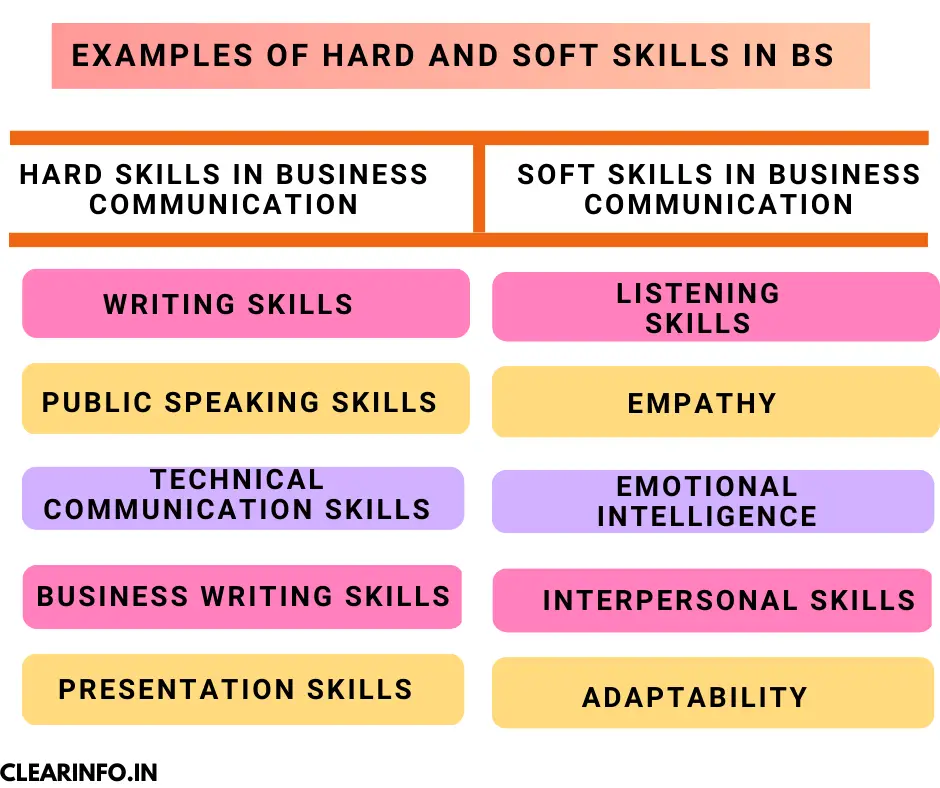Communication skills are the foundation of all business activities, whether it’s negotiating deals, presenting ideas, or simply communicating with colleagues and customers. According to Linkedin data insight on the most demanded skills in 2024, communication skills are ranked second.
Good communication skills can help individuals build stronger relationships, increase productivity, and achieve better results. On the other hand, poor communication skills can lead to misunderstandings, delays, and even conflict. Therefore, mastering business communication skills are essential for anyone who wants to thrive in the modern workplace.
What are business communication skills?
Business communication skills refer to the ability to effectively convey information and ideas within a business environment. This encompasses various forms of expression, including written and spoken language, as well as nonverbal cues like body language and tone of voice.
To communicate effectively in a business environment, one must have the ability to articulate complex ideas with clarity and accuracy and understand the need of business communication to establish positive relationships with colleagues, clients, and customers.
Developing trust and credibility is also essential in business communication, as it can help foster long-lasting relationships that benefit both the organization and the individual.
Top 10 business communication skills
Effective business communication skills are essential for professionals at all levels.
Let’s explore them in detail:
1) Active Listening skill: Listening is a critical communication skill that involves hearing what someone says and understanding and processing the information. To engage in active listening, one must be attentive, focused, and fully present with the speaker. This involves not only paying close attention to what is being said but also asking questions and providing feedback to confirm understanding.
2) Clear and Concise Writing skills: Having strong writing skills is crucial for successful business communication. To achieve this, it is important to use simple and direct language, avoid jargon or technical terms that may be unfamiliar to the reader, and organize the information in a logical manner. It is also important to consider the audience and the purpose of the communication when choosing the appropriate tone and language.
A survey of employers conducted by the Association of American Colleges and Universities found that 89 percent of employers say that colleges and universities should place more emphasis on “the ability to effectively communicate orally and in writing.”
3) Presentation Skills: Being able to deliver engaging and effective presentations is an important business communication skill. This includes using appropriate visuals and presentation tools, structuring content clearly and logically, and delivering information engagingly and compellingly.
4) Nonverbal Communication skill: Nonverbal communication involves body language, tone of voice, and facial expressions. Understanding and effectively using nonverbal communication can help build trust and rapport with colleagues, clients, and customers. It is important to be aware of one’s own nonverbal cues, as well as to be able to interpret the nonverbal cues of others.
Related Reading:
8 Types of Non-Verbal Communication With Examples & Competences
What are the advantages and disadvantages of nonverbal communication
5) Conflict Resolution skill: Conflict is an inevitable part of business communication, and being able to resolve conflicts effectively is an important skill. This involves active listening, empathy, and the ability to find mutually beneficial solutions.
6) Emotional Intelligence skill: Emotional intelligence is a set of skills that allows individuals to recognize, understand and manage their own emotions, as well as perceive and comprehend the emotions of others. These skills include self-awareness, self-regulation, motivation, empathy, and social skills.
In short, emotional intelligence refers to the capacity to handle emotions effectively and use them to guide thinking and behavior in different situations. Emotional intelligence is an essential skill for building relationships and communicating effectively, as it allows individuals to communicate in a way that is sensitive to the emotions and needs of others.
7) Cross-Cultural Communication skill: To achieve effective communication in the context of global business, it is crucial to acknowledge and appreciate cultural differences. This includes being aware of the different ways that individuals from different cultures may communicate, as well as the different cultural norms and expectations that may influence communication.
Effective cross-cultural communication requires individuals to be open-minded, respectful, and willing to adapt their communication style to fit the cultural context.
8) Collaboration and Teamwork skill: Effective communication is essential for successful collaboration and teamwork. This involves sharing information, actively listening, and working together to achieve shared goals.
Effective communication in a collaborative environment requires individuals to be able to express their ideas clearly, ask questions, provide feedback, and work together to find solutions to problems. It is important to be open to different perspectives and to value the contributions of each team member.
9) Time Management skill: Time management is an important communication skill as it helps professionals prioritize tasks and communicate deadlines effectively. Effective time management involves setting priorities, breaking down tasks into smaller chunks, and being able to communicate timeframes and deadlines clearly.
10) Confidence and Assertiveness skill: Confidence and assertiveness are important business communication skills that help professionals communicate their ideas effectively and advocate for themselves and their organization. This involves being able to speak up and express ideas and opinions clearly and confidently, while also being respectful of others’ perspectives.
Importance of business communication skills in business
Effective business communication skills are essential for success in the modern business environment.
Professionals who possess strong business communication skills are better able to build relationships, collaborate effectively with colleagues and clients, and make informed decisions that drive business growth and success.
Good communication skills are essential for enhancing decision-making in business. By communicating information and ideas clearly and effectively, professionals can make informed decisions that are based on a solid understanding of the situation and the needs of stakeholders.
In addition, strong business communication skills can support innovation and creativity in the workplace. By communicating ideas and feedback clearly and effectively, professionals can foster a culture of innovation and creativity that drives business growth and success.
This includes the ability to communicate with clarity and conviction, express ideas and opinions in a respectful manner, and actively listen to the ideas and feedback of others.
Overall, effective business communication skills are essential for success in the modern business environment. Professionals who are able to communicate effectively and build strong relationships are better positioned to achieve their goals, drive innovation, and contribute to the success of their organization.
How to improve business communication skills in English
Improving business communication skills in English is essential for professionals who want to succeed in the global business workplace. Here are a few strategies that can help:

1. Practice Speaking and Listening: One of the most effective ways to improve business communication skills in English is to practice speaking and listening regularly.
This can involve participating in conversations with colleagues, attending meetings and networking events, and even practicing with language learning apps or tutors. Regular practice can enhance professionals’ proficiency, accuracy, and self-assurance in using the English language.
2. Expand Vocabulary: In order to communicate effectively in a professional environment, it is crucial to enhance one’s business vocabulary. Professionals can improve their vocabulary by reading business articles and books, watching business-related videos and webinars, and even taking vocabulary-building courses or workshops.
3. Improve Writing Skills: Effective writing skills are also critical for success in business. Professionals can improve their writing skills by reading and analyzing business writing, practicing writing business emails and reports, and seeking feedback from colleagues or mentors. Writing skills can also be improved by taking writing courses or attending workshops.
4. Focus on Pronunciation and Intonation: In English, pronunciation and intonation play a crucial role in effective communication.
Professionals can improve their pronunciation and intonation by practicing with native speakers, listening to English-language media, and even using speech recognition technology to analyze their own pronunciation and intonation.
To know more about Pronunciation and Intonation, check out Oxford’s online English lesson on intonation and how important is intonation in the following video.
5. Seek Feedback and Guidance: Finally, professionals can improve their business communication skills in English by seeking feedback and guidance from colleagues, mentors, or language tutors.
Feedback can help professionals identify areas for improvement and make adjustments to their communication style, while guidance can provide valuable insights and strategies for improving their English communication skills.
Related Reading: Importance of feedback in communication with examples
Overall, improving business communication skills in English requires a combination of practice, focus, and guidance. By using these strategies, professionals can improve their fluency, accuracy, and confidence in English, and achieve greater success in the global business environment.
Why is it important to improve your business communication skills
Having effective communication skills is crucial in establishing and sustaining robust business relationships. Professionals who can communicate information and ideas effectively can make better decisions that are based on a solid understanding of the situation and the needs of stakeholders.
Strong communication skills can also support innovation and creativity in the workplace. By communicating ideas and feedback clearly and respectfully, professionals can foster a culture of innovation and creativity that drives business growth and success.
Additionally, improving communication skills can help boost productivity in the workplace. When professionals communicate clearly and efficiently, they can reduce misunderstandings and minimize errors, allowing them to work more efficiently and get more done in less time.
Improving business communication skills is also essential for advancing career opportunities. Employers value professionals who can communicate effectively, and those who have strong communication skills are more likely to be promoted, given leadership roles, and succeed in their careers.
Overall, in today’s fast-paced and competitive business environment, having strong communication skills is essential for achieving success in business.
What are the best books for business communication skills?
1/ “Crucial Conversations: Tools for Talking When Stakes Are High” by Kerry Patterson, Joseph Grenny, Ron McMillan, and Al Switzler: This book helps readers navigate tough conversations with colleagues, bosses, and clients.
2/ “The Elements of Style” by William Strunk Jr. and E.B. White: This classic guide provides valuable insights on how to write clearly and effectively.
3/ “How to Win Friends and Influence People” by Dale Carnegie: This book provides practical advice on how to build relationships and connect with others in a professional setting.
4/ “Influence: The Psychology of Persuasion” by Robert Cialdini: This book explores the science behind persuasion and provides actionable insights on how to influence others.
5/ “Getting to Yes: Negotiating Agreement Without Giving In” by Roger Fisher and William Ury: This book provides a framework for effective negotiation that can help professionals reach mutually beneficial agreements.
6/ “Difficult Conversations: How to Discuss What Matters Most” by Douglas Stone, Bruce Patton, and Sheila Heen: This book helps readers navigate challenging conversations and resolve conflicts in a professional setting.
Recommended Reading: 15 Must-Read Business Communication Books for Career Success
Examples of hard and soft skills in business communication

Hard skills in business communication include:
- Writing skills: the ability to write clearly and effectively in a professional setting.
- Public speaking skills: the ability to communicate confidently and effectively to a large audience.
- Technical communication skills: The skill of being able to simplify intricate technical ideas for colleagues and clients who do not have technical expertise.
- Business writing skills: The skill of crafting proficient emails, business reports, proposals, and other documents relevant to the business.
- Presentation skills: The skill of producing and presenting compelling and impactful presentations.
Soft skills in business communication include:
- Listening skills: the ability to listen actively and attentively to colleagues and clients.
- Empathy: the ability to understand and relate to others’ perspectives and emotions.
- Emotional intelligence: The skill of being able to regulate one’s own emotions and react suitably to the emotions expressed by others.
- Interpersonal skills: The skill of being able to establish constructive relationships with colleagues and clients through effective communication.
- Adaptability: the ability to adjust communication style and approach to different situations and audiences.
Check out the blog by Jobvite, on knowing the importnace of hard and soft skill in workplace environment.
How can poor communication skills lead to poor business communication problems?
Poor communication skills can lead to a range of problems in business communication starting with causing misunderstandings. When people communicate poorly, their intended message may be misinterpreted, leading to confusion, mistakes, and potentially costly errors.
Another issue that can arise from poor communication skills in business is a breakdown in teamwork. Effective communication is essential for teamwork, and when individuals struggle to communicate with one another, it can result in decreased collaboration, decreased productivity, and an overall decrease in the quality of work being produced.
In short, poor communication skills can lead to a wide range of problems in business communication, including misunderstandings, a lack of clarity, and a breakdown in teamwork. Therefore, it is crucial for individuals to develop strong communication skills to succeed in the business world.
Business communication skills courses to try out in 2024
Based on our personal experience following are online courses available that can help you further enhance your business communication skills.
- Business Writing Skills for Professionals – Udemy
- Effective Communication in the Workplace – Coursera
- Communication Skills for Managers – LinkedIn Learning
- Writing Effective Emails – Skillshare
- Public Speaking for Professionals – edX
- Advanced Business English for Non-Native Speakers – Udemy
- Persuasive Communication Skills – LinkedIn Learning
- Effective Negotiation: Essential Strategies and Skills – Coursera
- Body Language for Entrepreneurs – Udemy
Frequently Asked Question
Q1) What are the 5 critical business communication skills?
Ans: The 5 critical business communication skills are effective writing, active listening, persuasion, presentation skills, and interpersonal communication. Mastering these skills can help professionals convey their messages clearly, build relationships with clients and colleagues, and achieve desired outcomes in the workplace.
Q2) What are the 7Cs of business communication?
Ans: The 7Cs of business communication are clarity, conciseness, completeness, concreteness, correctness, coherence, and courtesy. Following these 7Cs of business communication can help ensure that messages are effectively delivered to the intended audience and can lead to more successful business interactions.
Q3) What are the 4 essential skills for business communication?
Ans: The 4 essential skills for business communication are clarity, confidence, consistency, and collaboration. Professionals who possess these skills are better equipped to communicate effectively with clients and colleagues, build strong relationships, and achieve their business communication objectives. These skills are critical for success in today’s highly competitive business environment.



